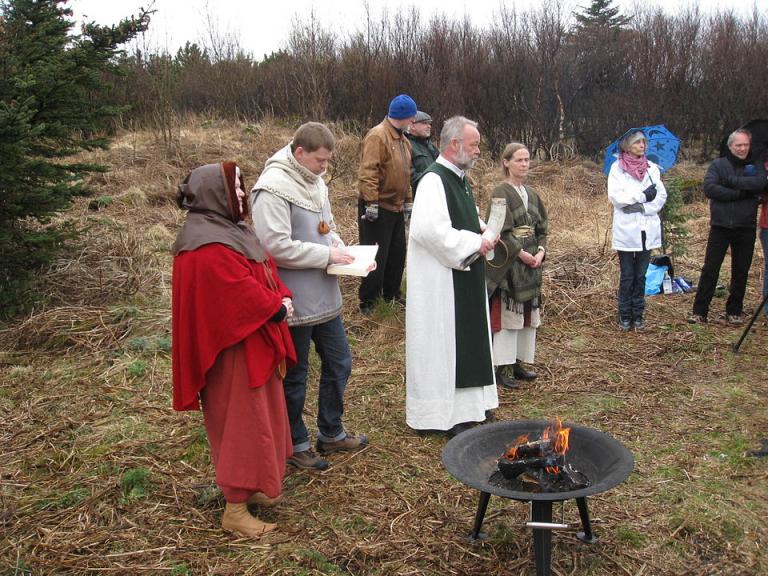Please bear with me on this post: it starts in one place, with me wanting to learn about a new religion, and ends in another, as I thought about my own faith. Along the way we’ll visit Iceland and Virginia, but our journey begins in my home state of Minnesota.
Drive a couple hours west of Minneapolis, and you’ll come to the tiny town of Murdock, part of what I’ve previously described as one of the most highly religious regions in the United States. In the 2010 U.S. Religion Census, about 82% of Swift County’s 10,000 residents adhered to some religious body. As is true in most of the Upper Midwest, Lutherans (48%) and Roman Catholics (25%) accounted for most of the faithful ten years ago. But the religious landscape in the Upper Midwest is shifting, as old institutions decline and new ones move in.
Since that 2010 census, Calvary Lutheran Church has closed. Just down Main Avenue from Murdock’s bank and post office, that 120-year old building was purchased earlier this year by a very different religious group: the Asatru Folk Assembly (AFA), which this fall will formally rededicate what it now calls the Baldurshof.
https://www.instagram.com/p/CBwIGnDn0Sc/
Philip is our resident expert on modern paganism, but I’ll take a shot at summary: (for more detail, see this introduction from our neighbors at the Patheos Pagan channel)
Founded in Iceland about fifty years ago, Ásatrú is a relatively new pagan movement that venerates the Norse deities of pre-Christian Scandinavia. According to one attempt at conducting a census of the self-described “heathen” world, it claims under 10,000 followers in this country.
But small and young as it is, Ásatrú nonetheless contains multiple branches. As Sigal Samuel reported in a 2017 article in The Atlantic, it is “less a single codified religion than a loose cluster of religions: It has no central authority or agreed-upon dogma. Although many followers cherish this ideological openness, it may leave the religion vulnerable to misappropriation.”
Specifically, misappropriation by white supremacists.
The Atlantic‘s article was prompted by the appearance of Ásatrú symbols among far-right marchers in Charlottesville, Virginia in August 2017. “We are absolutely horrified,” Iceland’s chief Ásatrú priest told Samuel. To him, racism is a “total perversion” of a religion that celebrates inclusion and diversity. (See also this Patheos Pagan post from 2015, lamenting that the construction of a new Ásatrú temple in Iceland provoked hate mail from fellow heathens.)
Yet the group putting down roots in western Minnesota claims that Ásatrú “encapsulates the belief of all the Ethnic European Folk” and is “part of the great Aryan religiosity.” Here’s part of the AFA’s Declaration of Purpose:
Asatru is an ancestral religion, one passed down to us from our forebears and thus tailored to our unique makeup…. If the Ethnic European Folk cease to exist Asatru would likewise no longer exist. Let us be clear: by Ethnic European Folk we mean white people. It is our collective will that we not only survive, but thrive, and continue our evolution in the direction of the Infinite. All native religions spring from the unique collective soul of a particular race. Religions are not arbitrary or accidental; body, mind and spirit are all shaped by the evolutionary history of the group and are thus interrelated. Asatru is not just what we believe, it is what we are. Therefore, the survival and welfare of the Ethnic European Folk as a cultural and biological group is a religious imperative for the AFA.
In its Statement of Ethics, the AFA particularly emphasizes its “support of strong, healthy white family relationships,” so that “our children… grow up to be mothers and fathers to white children of their own.”
In an article last month in the [Minneapolis] Star Tribune, one scholar of heathenism noted that the group in Murdock is trying to “sanitize” its image through benign social media posts. But the director of a pagan seminary in South Carolina insisted to the same reporter that AFA members “hold white supremacist beliefs.”
For a deeper dive into those beliefs, and the connections of the AFA’s founder and current leader to other far-right groups, read this well-researched article in the West Central Tribune or the local blogger’s post that originally reported the Baldurshof story.
I’m certainly no expert on any of this. [For example, I wasn’t sure how to sort out the disputed origins of a movement as decentralized as Ásatrú. I went with the early 1970s as a start date because that’s what’s most commonly cited in stories like the one in The Atlantic, but the AFA claims to have started a few years before that — in the U.S. rather than Iceland — and a commenter suggests still older origins.] But for Anxious Bench readers, let me just note that the debate within the larger Ásatrú movement mirrors a debate within Christianity — and reiterates some of what’s problematic about a certain phrase popular in some theologically conservative circles.

At multiple points, the AFA home page decries the influence of what it calls “cultural Marxism.” It says that it “supports the efforts of all cultural and biological groups to maintain their identity and opposes the cultural marxists who would reduce all of humanity to an indistinguishable gray mass.”
What is “cultural Marxism”? As sociologist Andrew Lynn explained in a 2018 issue of The Hedgehog Review, that ideology — traced back to 20th century thinkers like Antonio Gramsci and Theodor Adorno and only distantly to Karl Marx himself — has become a “specter haunting the imaginations of many in the modern West… Its influence, the suspicious say (and the suspicious range from the moderately conservative to the screamingly extreme alt-right), is evident in everything from gender-neutral pronouns to training in detecting microaggression to, well, virtually every aspect of what is now called identity politics.”
To the AFA, this threat (which Lynn argues is overblown) is not from secular thinkers outside Ásatrú, but fellow pagans within it. “In the late 1980’s and early 90’s,” they claim, “the original values and aims of Asatru were growingly subverted by the decay of cultural marxism.” The AFA, in that sense, sees itself as a kind of traditionalist movement of heathen renewal combatting the influence of people like Karl Seigfried. An Ásatrú priest and scholar of Norse mythology who takes some inspiration from Catholic liberation theology, Seigfried told The Atlantic that he’s committed to making an inclusive, progressive faith active in politics and society, staking out Ásatrú positions on issues like climate change, abortion, and LGBTQ rights.
I keep hearing cultural Marxism is going to destroy the #SBC but there might be an alternative. https://t.co/oEe1V2Ey6k
— Adam Wyatt. – right back where I started 3 yrs ago (@pastor_adam) June 29, 2020
Setting paganism to the side… It is striking that, among certain Christians, “cultural Marxism” has also become a convenient label by which to tar not just secular critics, but fellow Christians. In a widely shared post earlier this year, John Onwucheka explained that his church left the Southern Baptist Convention in part because, “in our circles, whenever issues of justice are brought up, there are immediate accusations of being unduly influenced by critical race theory and cultural Marxism (they did it to the prophets of old who wanted to drink out of the same water fountains).” (Just Google “cultural Marxism SBC” if you doubt what he says.)
Some conservatives have urged caution in using the phrase because it is closely associated with groups like the Asatru Folk Assembly. For example, while he believes that Marxist ideas antithetical to Christianity do live on in critical theory, Rob Smith warns that “cultural Marxism” is closely tied to far-right conspiracy theories, many of them anti-Semitic. He’s not ready to drop the phrase entirely, but Smith does acknowledge that some Christians use it to demonize fellow believers, particularly those committed to combating white supremacy.
So let me give the final word to Ameen Hudson of The Witness, for what he wrote in 2018 seems all the more important in 2020:
By using the term “cultural Marxist,” some conservatives falsely conflate Christians who fight for justice with others whom these Christians don’t agree with—and indeed openly reject. I can’t tell you how many sound, Bible-believing leaders (especially in the Reformed tradition) have received critiques—even from members of their own churches—accusing them of being politically liberal or Marxist simply because they speak about racial justice and equality from the pulpit….
Our kingdom citizenship trumps our national citizenship, and as kingdom citizens, we have a responsibility to love our neighbor as ourselves and to demand justice for the weak. If you push back against the biblical imperatives of love and justice for the vulnerable, then cultural Marxism isn’t the problem. You are.













